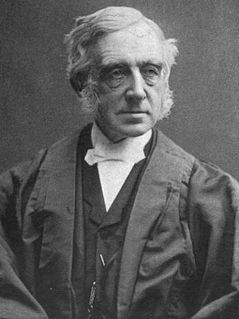A Quote by John Flavel
There is no grace more excellent than faith; no sin more execrable and abominable then unbelief. Faith is the saving grace and unbelief the damning sin. (Mark 16:16) ... Before Christ can be received, the heart must be emptied and opened: but men's heart's are full of self-righteousn ess and vain confidence (Rom 10:3).
Related Quotes
True repentance is no light matter. It is a thorough change of heart about sin, a change showing itself in godly sorrow and humiliation - in heartfelt confession before the throne of grace - in a complete breaking off from sinful habits, and an abiding hatred of all sin. Such repentance is the inseparable companion of saving faith in Christ.
If we let ourselves believe that man began with divine grace, that he forfeited this by sin, and that he can be redeemed only by divine grace through the crucified Christ, then we shall find peace of mind never granted to philosophers. He who cannot believe is cursed, for he reveals by his unbelief that God has not chosen to give him grace.
For God is not gracious and merciful to sinners to the end that they might not keep his Law, nor that they should remain as they were before they received grace and mercy; but he condones and forgives both sin and death for the sake of Christ, who has fulfilled the whole Law in order thereby to make the heart sweet and through the Holy Spirit to kindle and move the heart to begin to love from day to day more and more.
Christ will be master of the heart, and sin must be mortified. If your life is unholy, then your heart is unchanged, and you are an unsaved person. The Savior will sanctify His people, renew them, give them a hatred of sin, and a love of holiness. The grace that does not make a man better than others is a worthless counterfeit. Christ saves His people, not IN their sins, but FROM their sins. Without holiness, no man shall see the Lord.
... the core of sin is a lack of self-esteem. ... Sin is psychological self-abuse. ... the most serious sin is one that causes me to say, 'I am unworthy. I may have no claim to divine sonship if you examine me at my worst.' For once a person believes he is an 'unworthy sinner,' it is doubtful if he can really honestly accept the saving grace God offers in Jesus Christ.
It gave me no pleasure to see people drink in my opinions if they seemed ignorant of Jesus Christ and the value of being saved by Him. Sound conviction for sin, especially the sin of unbelief, and a heart set on fire to be saved by Christ, with a strong yearning for a truly sanctified soul-this was what delighted me; those were the souls I considered blessed.
Seek for a fresh invoice of grace. Unbelief can scoff or growl; faith is the nightingale that sings in the darkest hour. Faith can draw honey out of the rock and oil out of the flint. With Christ in possession and heaven in reversion, it marches to the time of the One-hundred-and-third Psalm over the roughest road, and against the most cutting blast.
With faith in the merciful Redeemer and His power, potential despair turns to hope. One's very heart and desires change, and the once-appealing sin becomes increasingly abhorrent. A resolve to abandon and forsake the sin and to repair, as fully as one possibly can, the damage he or she has caused now forms in that new heart. This resolve soon matures into a covenant of obedience to God. With that covenant in place, the Holy Ghost, the messenger of divine grace, will bring relief and forgiveness.
So let's set the record straight. Faith is not the opposite of reason. The opposite of faith is unbelief. And reason is not the opposite of faith. The opposite of reason is irrationality. Do some Christians have irrational faith? Sure. Do some skeptics have unreasonable unbelief? You bet. It works both ways.
Faith is a living, daring confidence in God's grace, so sure and certain that a man would stake his life on it one thousand times. This confidence in God's grace and knowledge of it makes men glad and bold and happy in dealing with God and with all creatures; and this is the work of the Holy Ghost in faith.
Men have, for the most part, done with lamenting their lost faith. Sentimental tears over the happy, simple Christendom of their fathers are a thing of the past. They are proclaiming now their contempt for Christ's character, and their disgust at the very name of love. Scorn and hatred, difference and division, must be more than ever our lot, if we would be the followers of Christ in these days. Conventional religion and polite unbelief are gone forever.
Repentance is being sorry enough to quit your sin. You will never know the forgiving mercy of God while you are still wedded to your sins. Repentance is the soul's divorce from sin, but it will always be joined to faithRepentance that is not joined to faith is a legalistic repentanceProfessed faith that is not joined to repentance is a spurious faith, for true faith is faith in Christ to save me not in but from my sin. Repentance and faith are inseparable, and 'unless you repent you will all likewise perish' (Luke 13:3).




































